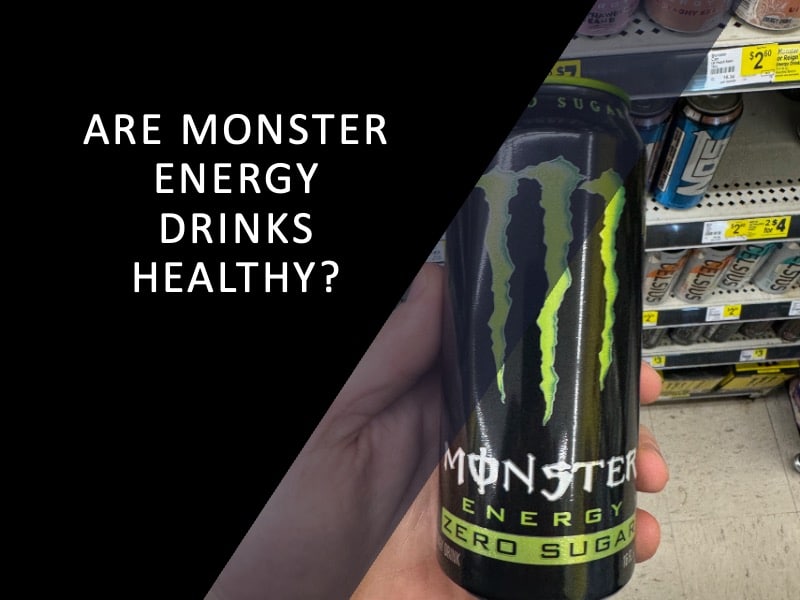Are Monster Energy Drinks Healthy? Reviewing the Ingredients
Are Monster Energy Drinks Healthy? These popular beverages promise a quick energy boost, but their high sugar, artificial additives, and excessive caffeine content raise concerns about their impact on long-term health.
Monster Energy Drinks have become a go-to solution for people seeking a quick jolt of energy to power through long days, late nights, or intense tasks.
Their bold flavors and high-energy promise make them enticing, but their ingredient profile raises important questions.
With high sugar content, artificial additives, and excessive caffeine levels, these drinks may provide a short-term boost, but at what cost to your health?
While Monster Energy Drinks might seem like an easy solution, they aren’t the healthiest choice for sustained energy, particularly for daily use.
Fortunately, there are smarter alternatives. Options like Celsius Drinks offer a clean energy boost paired with metabolism-supporting ingredients, while RSP AminoLean provides functional benefits for active lifestyles.
Natural choices such as matcha tea or homemade energy drinks not only deliver energy but also nourish your body without the crash or long-term health risks.
This article explores whether Monster Energy Drinks are healthy or not and how healthier alternatives can provide the energy you need without compromising your well-being!
In my opinion, the best alternative to Monster Energy Drinks is Celsius Energy Drinks, with on-the-go Celsius packets offering the most convenient and affordable option for a clean and effective energy boost.
Types of Monster Energy Drinks
Monster Energy Drinks come in a wide range of varieties, including the original Monster Energy, Monster Ultra, Monster Rehab, Monster Juice, and Monster Hydro. Each category has unique formulations catering to specific preferences:
Original Monster Energy
The original Monster Energy drink is the flagship product of the brand, known for its high caffeine and sugar content. A standard 16-ounce can contains:
- Caffeine: 160 mg, equivalent to roughly 1.5 cups of coffee.
- Sugar: 54 grams, exceeding the American Heart Association’s daily recommended intake of added sugars (36 grams for men, 25 grams for women).
- Other Key Ingredients: Taurine, guarana, and B-vitamins (B2, B3, B6, and B12) to boost energy and metabolism.
The combination of these ingredients delivers an intense energy boost but poses significant risks for those sensitive to sugar or caffeine.
Monster Ultra
Monster Ultra is marketed as a “healthier” option for those seeking energy without the added calories from sugar. A 16-ounce can includes:
- Caffeine: 140 mg, slightly less than the original.
- Artificial Sweeteners: Sucralose and ace-K replace sugar, making it calorie-free.
- Flavor Options: A wide range of flavors, including Ultra Paradise, Ultra Gold, and Ultra Watermelon, designed to appeal to diverse palates.
While it avoids the sugar spike, concerns remain about the long-term health impacts of artificial sweeteners.
Monster Rehab
Monster Rehab is a hybrid product combining tea, lemonade, and Monster’s energy blend. It’s marketed as a “refreshing” alternative for hydration and energy replenishment. A 16-ounce can contains:
- Caffeine: Around 80-90 mg, lower than other Monster varieties.
- Sugar: Typically less than 10 grams, though artificial sweeteners are used to maintain sweetness.
- Hydration Focus: Includes electrolytes and coconut water in some versions to support hydration after exercise.
Although lower in sugar and caffeine, it’s still not free from artificial additives.
Monster Juice
Monster Juice combines fruit juices with the classic energy blend, creating a sweeter, more flavorful product. A 16-ounce can includes:
- Caffeine: 160 mg, similar to the original.
- Sugar: Up to 50 grams, despite the presence of fruit juices.
- Vitamins and Flavoring: Contains added vitamins and a variety of fruit-based flavors like Mango Loco and Pacific Punch.
The high sugar content may overshadow the presence of any natural juice, making this variety less suitable for health-conscious consumers.
Monster Hydro
Monster Hydro stands out as a non-carbonated, lightly sweetened energy drink designed to appeal to those seeking hydration with a boost. A 16-ounce bottle includes:
- Caffeine: 100-150 mg, depending on the flavor.
- Sugar: 23 grams, significantly less than the original.
- Electrolytes: Added to support hydration, making it a potential option for athletes.
Monster Hydro offers a middle ground between energy and hydration but still contains added sugars and artificial flavorings.
Common Ingredients in Different Monster Energy Drinks
The primary active ingredients in Monster Energy Drinks include:
- Caffeine: Found in varying amounts (140-160 mg per can), caffeine is a central nervous system stimulant that boosts alertness and focus. However, excessive caffeine consumption can lead to side effects such as jitteriness, insomnia, and increased heart rate.
- Taurine: An amino acid believed to support cardiovascular health and energy production. While taurine is generally safe in moderate amounts, its long-term effects in energy drinks remain unclear.
- Guarana: A plant extract high in caffeine, guarana amplifies the stimulant effects of the drink, potentially pushing total caffeine content higher than labeled.
- B-Vitamins: Essential for energy metabolism, these vitamins are included in high amounts. While generally safe, excessive intake can cause imbalances.
- Sugars and Artificial Sweeteners: Regular Monster drinks are loaded with sugar, contributing to obesity, diabetes, and tooth decay risks. Sugar-free versions often rely on artificial sweeteners, which may have their own health concerns.
My Concerns with Monster Energy Drinks

Monster energy drinks are not healthy or good for you, and I have several concerns with the consumption of these drinks.
Along with their health impacts, Monster Energy Drinks are sold in single-use cans, contributing to packaging waste.
Although aluminum cans are recyclable, not all are disposed of properly. Consumers seeking eco-friendlier options should consider brands actively engaging in sustainability efforts, such as the Celsius On-the-Go Packets, which are healthier, more affordable, and more convenient.
Transparency in Labeling
Monster Energy Drinks list their ingredients as part of proprietary blends, which can obscure the exact amounts of specific components, such as guarana or taurine.
This lack of transparency makes it difficult for consumers to know the precise caffeine content, which could exceed safe levels when combined with other stimulants.
High Sugar Content
Regular Monster Energy Drinks can contain more than 50 grams of sugar per can, which is well above the daily recommended limit.
Consuming such high sugar levels increases the risk of obesity, type 2 diabetes, and metabolic syndrome.
Excessive Caffeine
The high caffeine content in Monster Energy Drinks can lead to side effects like increased heart rate, elevated blood pressure, and sleep disturbances, especially when consumed in large quantities or by caffeine-sensitive individuals.
Additionally, energy drinks may not be suitable for certain groups, including teenagers, pregnant women, and individuals with cardiovascular conditions.
Health organizations recommend limiting caffeine intake to 400 mg per day for adults and far less for younger individuals, which could be exceeded with just two cans of Monster Energy.
Artificial Ingredients and Additives
Ingredients like artificial sweeteners, preservatives, and synthetic flavors may have potential long-term health implications, including hormonal disruptions and gut microbiome imbalances.
Sugar-free Monster Energy Drinks rely on artificial sweeteners like sucralose and ace-K to reduce calorie content. While generally recognized as safe, some studies suggest potential links between artificial sweeteners and gut microbiome disruption, metabolic issues, and cravings for sweet foods.
Dependency and Overuse
Regular consumption of energy drinks may lead to caffeine dependency and withdrawal symptoms. The combination of stimulants can also result in overuse, causing adverse health effects.
Monster Energy’s marketing appeals to younger demographics and emphasizes extreme sports and high-performance lifestyles.
These tactics may contribute to overconsumption, especially among teenagers who may be unaware of the potential risks.
Best Alternatives to Monster Energy Drinks
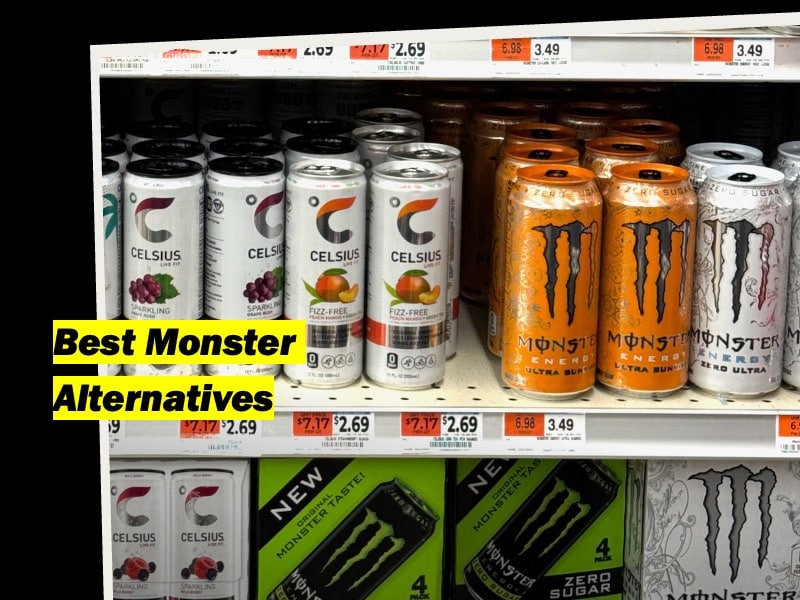
While Monster Energy Drinks provide a quick and powerful energy boost, healthier alternatives offer sustained energy without the drawbacks of high sugar, excessive caffeine, or artificial ingredients.
Here are some of the healthiest alternatives to Monster energy drinks:
| Drink | Caffeine (mg) | Sugar (g) | Artificial Sweeteners | Calories |
|---|---|---|---|---|
| Monster Original | 160 | 54 | No | 230 |
| Monster Ultra | 140 | 0 | Yes | 10 |
| Celsius | 200 | 0 | No | 10 |
| RSP AminoLean | 125 | 0 | No | 0 |
| Matcha Tea (8 oz) | 70 | 0 | No | 0-30 |
Celsius Drinks
I believe Celsius Drinks are the healthiest energy drink and an excellent alternative to Monster Energy Drinks due to their cleaner ingredient profile and functional benefits.
Unlike Monster, Celsius uses natural caffeine sourced from green tea extract and guarana, delivering 200 mg of caffeine per can.
This is slightly higher than Monster’s 160 mg but is paired with additional ingredients like ginger and green tea for a smoother energy boost. Celsius energy drinks have pros and cons, but they are certainly healthier than Monster energy drinks.
Pros of Celsius Energy Drinks:
- Free from artificial sweeteners, relying instead on natural flavors and minimal sugars.
- Contains thermogenic ingredients that may help boost metabolism and support fat loss.
- Low in calories, with only 10 calories per can.
Cons of Celsius Energy Drinks:
- The high caffeine content in Celsius drinks may not be suitable for those sensitive to stimulants.
- Some flavors use citric acid and stevia, which might not appeal to everyone.
If you are comparing Monster vs. Celsius, Monster is known for its bold flavors and sugar-packed energy, but Celsius prioritizes health-conscious consumers with its cleaner formulation.
The inclusion of metabolism-enhancing ingredients and lack of artificial sweeteners gives Celsius a clear edge for those seeking long-term health benefits.
If you’re looking for an energy drink that supports weight loss goals and avoids unnecessary additives, Celsius is an excellent choice.
Additionally, Celsius On-the-Go packets offer an affordable and portable alternative to Monster energy drinks.
Last update on 2025-04-29 / This article includes affiliate links/Images via Amazon Product Advertising API. I may earn commissions on purchases made through these links.
RSP AminoLean
RSP AminoLean is a versatile pre-workout supplement that doubles as an energy booster. In addition to 125 mg of caffeine, it includes essential amino acids (EAAs) and CLA (conjugated linoleic acid) to support muscle recovery and fat metabolism.
Unlike Monster, it is entirely sugar-free, making it ideal for those on calorie-controlled diets.
I’ve used RSP AminoLean on and off for over 10 years, and I know this pre workout supplement provides sustained energy for workouts or daily productivity without the crash often associated with sugar-laden energy drinks. It is also free of artificial sweeteners, making it a clean, effective alternative.
Last update on 2025-04-29 / This article includes affiliate links/Images via Amazon Product Advertising API. I may earn commissions on purchases made through these links.
Bloom Energy Drinks
Bloom Energy Drinks are a cleaner energy option that Monster energy drinks with added prebiotic fiber to improve gut health.
Celsius drinks are my favorite Monster alternative, but Bloom Energy Drinks have several properties that support gut health and provide clean, lasting energy.
Ingredients in Bloom Energy Drinks include:
- 180 mg of natural caffeine from green coffee beans.
- Contains L-theanine for improved focus and cognitive function.
- Zero sugar and gut-friendly ingredients.
Last update on 2025-04-29 / This article includes affiliate links/Images via Amazon Product Advertising API. I may earn commissions on purchases made through these links.
Matcha or Green Tea
I know that many people who rely on the heavy energy kick of Monster energy drinks might not think green or matcha tea is strong enough, but it is a great option if you are willing to try!
Both matcha and green tea are natural sources of caffeine, offering a gentler boost compared to energy drinks.
Matcha is especially beneficial, containing L-theanine, an amino acid that promotes relaxation and focus, balancing the stimulating effects of caffeine.
Green tea is also rich in antioxidants like catechins, which can support overall health and metabolism.
Unlike Monster or other commercial energy drinks, these options are free from added sugars and artificial ingredients, making them a wholesome choice for sustained energy.
Final Thoughts: Are Monster Energy Drinks Good for You?
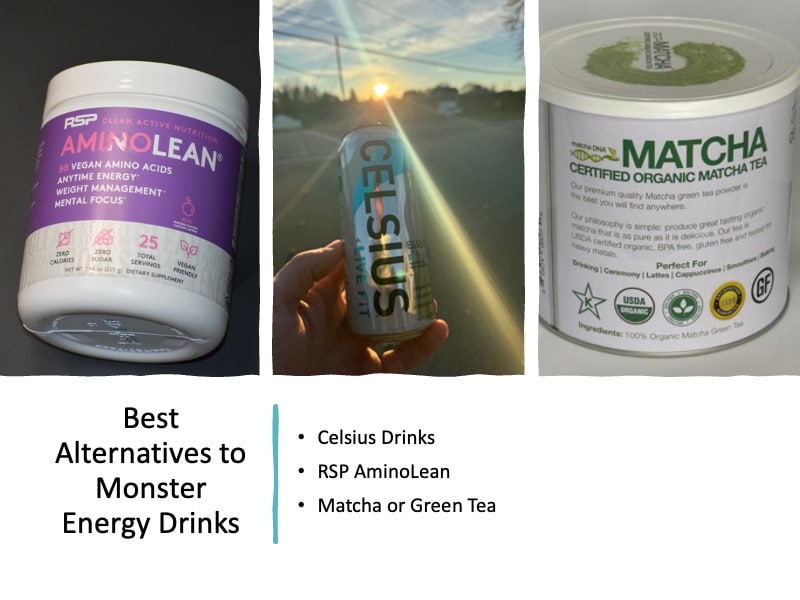
Monster Energy Drinks can serve their purpose for a quick jolt of energy when you’re dragging through the day or need a boost for a late-night task.
However, their high sugar content, artificial ingredients, and excessive caffeine levels make them less-than-ideal for regular consumption.
They may deliver a temporary energy spike, but the crash that follows, coupled with potential long-term health risks, makes them a questionable choice for sustained well-being.
One of the key concerns with Monster is how it aligns with modern convenience culture.
It’s easy to grab a can and power through your day, but at what cost?
Relying on these drinks can mask underlying issues like poor sleep, inadequate hydration, or nutritional deficiencies.
In the long run, addressing these root causes will provide more sustainable energy than any canned solution.
Healthier alternatives, such as Celsius Drinks, stand out because they’re designed with wellness in mind. Celsius not only gives you a clean energy boost but also supports your metabolism and fitness goals, making it a functional beverage rather than just a quick fix.
RSP AminoLean takes this a step further by combining energy-boosting ingredients with essential amino acids, catering to active lifestyles without the crash.
Natural options like matcha tea or homemade energy drinks also bring a fresh, creative approach to fueling your day while being kinder to your body.
A fresh perspective to consider is how energy drinks like Monster play into our daily rituals. For many, energy drinks are more than just beverages—they’re symbols of hustle and productivity.
But what if we redefined productivity to include taking care of our bodies, choosing nourishment over shortcuts, and embracing sustainable energy sources?
Swapping a can of Monster for matcha, green tea, or even a homemade energy drink is not just a choice for your health—it’s a choice for how you want to live.
Ultimately, the occasional Monster Energy Drink is unlikely to harm a healthy adult, but building a habit around it can lead to dependency and potential health issues over time. If you’re looking for energy that doesn’t compromise your long-term health, there are better options out there.
Choosing alternatives like Celsius Drinks or creating your own natural energy boosts can help you maintain energy levels without sacrificing your well-being or over-relying on quick fixes.
Related Reading: Red Bull vs. Celsius: Is Celsius Better than Red Bull?

